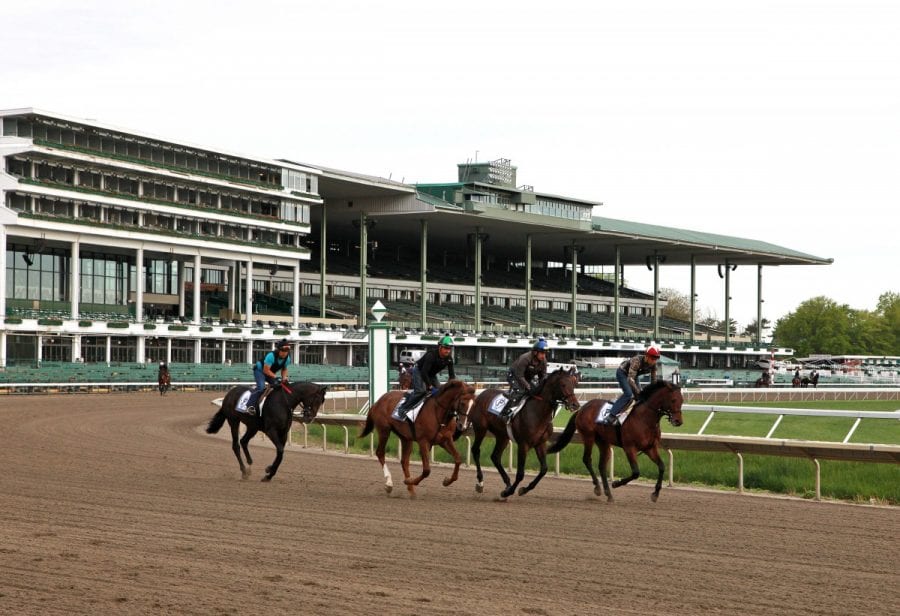NJ WHIP RULES LEAVE JOCKEYS HOPING FOR “HAPPY MEDIUM”

As the official thoroughbred racing meet at Monmouth Park drew to a close September 27, the racing community was wrestling with a new rule that will be in place when racing returns to the Jersey Shore in May 2021 – the prohibition on the use by jockeys of the riding crop to encourage horses.
The New Jersey Racing Commission unanimously adopted the new rule – currently the strictest such rule in the United States – September 16, near the end of a Monmouth Park meet shortened this year to just 37 dates because of the COVID-19 pandemic.
Beginning next year, jockeys will not be allowed to use the riding crop “except when necessary to control the horse for the safety of the horse or rider” according to the new regulation, meaning that it will be only to avoid any injury to the horse or the jockey.
“The prohibition of the use of riding crops, except when necessary for the safety of horse or rider, will be perceived in a positive light by the general public,” the New Jersey Racing Commission said in a “social impact” statement accompanying the regulation. “The proposed repeal and new rules are of the utmost importance in adapting the industry to avoid the currently negative public perception of whipping a horse.”
New Jersey State Attorney General Gurbir Grewal was adamant about the adoption of the new rule, which has met with serious concerns from horsemen and jockeys alike in the Garden State.
“We take seriously our responsibility to protect all horse racing participants here in New Jersey,” Grewal said in a statement he issued when the regulations were proposed last fall. “We believe the reforms we’ve proposed will make the actual competition safer and more humane for all concerned, and at the same time enhance the State’s understanding of pre-existing health conditions and other trends that could endanger the lives of race horses.”
The new rule has both jockeys and trainers alike stunned.
“I feel really, really sad,” said jockey Antonio Gallardo, who finished fourth in the riders’ standings at the Monmouth Park meet with 37 wins and more than $1.25 million in total earnings. “We really need the whip. Sometimes, the horse is shy and needs to move straight. Sometimes, the whip is used to move the horse forward. Sometimes, the horse is not paying attention. How do you teach the horse these things? It’s ridiculous.”
Veteran jockey Jose Ferrer echoed Gallardo’s sentiments.
“I don’t think we’re abusing the horses,” said Ferrer, who finished sixth with 27 wins and $881,000 in purses at Monmouth this summer and surpassed 4,500 wins for his career. “I’m never beating the horse to make it run. I tap the animal two or three times. I never abuse the animal. You use the whip to see the horse respond. But to completely ban? The jockeys love the animals. The trainers love the animals. I love my horses. I want the best for them always. I’ve been around 37 years and I’ve never saw a horse abused.”
- Grayson-Jockey Club Foundation announces 2025 funding
 More than $2.6 million in Grayson-Jockey Club Foundation funding will support 16 new and 10 continuing projects.
More than $2.6 million in Grayson-Jockey Club Foundation funding will support 16 new and 10 continuing projects.
Kelly John Breen, who recently claimed the top trainer’s title at Monmouth Park for the third time in his career, saddling 32 winners and earning $1.1 million in purses, was incensed when asked about the new whip rule, which he admitted he didn’t know was officially adopted until he received a phone call from The Racing Biz.
“I wish I knew where it was coming from,” Breen said. “I wish they would have reached out to the other trainers or jockeys. I think we’re all about the safety of the horses. The public perception is that whipping the horses is bad. But our business is based on gambling and winning. And I want my horses to run as fast as they can and to win. It’s not all about the money, but when you’re not making it, it’s all about the money. I’m going to try my darnedest to win the race.”
Added Breen, “For us to not to be asked about it is ridiculous. I don’t get it.”
Breen said that the whip is used as a training tool.
“The younger horses are scared going on to the track,” Breen said. “Heck, they’re scared of everything. To try to get the horse where we want them to go and our riders need the whip to keep them going straight or coming out of the starting gate. I have horses that don’t like to be whipped, plain and simple. I’d like to think that a lot of the jockeys are knowledgeable of when they’re going to the whip too much.”
Breen said that riders already use a crop that “is like a Nerf dart at the end of a stick. It’s made of a soft Styrofoam. It’s easier on the horse.”
NJRC rules state that such a tool must be “soft-padded” with “a shaft and a soft tube” and should not exceed eight ounces in weight or 30 inches in length.
“The shaft, beyond the grip, must be smooth, with no protrusions or raised surface, and covered by shock absorbing material that gives a compression factor of at least one millimeter throughout its circumference,” according to the new rules.
In addition to the provisions regarding the construction of the crop, the rule specifies its use. It forbids the use of the crop except “to control the horse to avoid injury to the horse or rider” and directs that it can only be used on the shoulders or hind quarters of the horse.
The rule applies both to jockeys and exercise riders.
Riders who violate the rule may be fined or suspended, and if, in the opinion of the stewards, a jockey’s illicit crop use caused a horse to attain a better placing, “the jockey’s share of the purse shall be forfeited.”
The rule does not, however, direct a change in the order of finish.
“I wish they (the members of the NJRC) asked us to get some sort of feedback,” Ferrer said. “We’re the ones on top of the horse. It’s a 1,500-pound animal that we have to grab the reins. We need the tool to make sure the horse goes straight. There are so many things going on. But to completely ban the whip is not fair. They’re going to completely change the game around. I completely disagree with it.”
- Coal Battle’s West Virginia connection
 Kentucky Derby contender Coal Battle has a couple of big fans in West Virginia, whose connection is through the horse’s WV-bred dam.
Kentucky Derby contender Coal Battle has a couple of big fans in West Virginia, whose connection is through the horse’s WV-bred dam.
Gallardo echoes those sentiments.
“If you rode a horse, you know what the whip is for,” Gallardo said. “When they see that they’re losing money, then they’ll put it back. I don’t know who put the rule in. It doesn’t make any sense. I think that most jockeys are fighting to win the race. If you feel it’s needed, you use the whip. If you have no horse left, you don’t use it. It’s very important to us.”
Stewards will be in charge of determining whether jockeys used the whip to maintain control of the horse, and will be able to fine or suspend jockeys if they determine a jockey used the whip “to achieve a better placing.”
The rule continues: “If the riding crop is used, under the supervision of the stewards, there shall be a visual inspection of each horse following each race for evidence of excessive or brutal use of the riding crop.”
Ferrer is hopeful that the rule might in future be modified.
“Maybe we can come to a happy medium, like in Canada or Saudi Arabia, where jockeys can only use the whip no more than eight times in a race,” Ferrer said. “I think it’s going to be hard on the bettors who want to see us win. There are going to be a lot of disappointed people who bet.”
A rule in Maryland currently limits jockeys to six strikes of the whip. It replaced an earlier, 10-strike limit that had generally been well received.
There’s no question that racing has been under intense public scrutiny, especially in the last couple of years. Efforts to modify – or in this case, prohibit – whip use are one of the more controversial, and many argue, less well thought-out, byproducts of that scrutiny.
Breen, who has endured the ups and downs of Monmouth Park, his home track, over the years, thinks this rule will be another slap in the face of New Jersey thoroughbred racing.
“I think it’s going to impact racing in New Jersey negatively,” Breen said. “I think it’s going to drive people from horse racing, drive people away from owning a horse and drive people away from betting on a horse. I love the horses, but I want to win and I’m glad when I can help a horse to win. I love to get the horses to run as fast as they can.”
LATEST NEWS
















Monmouth Park is a track that I won’t be betting in 2021, PERIOD! Per the article
the New Jersey Racing Commission said “the prohibition of the use of riding crops, except when necessary for the safety of horse or rider, will be perceived in a positive light by the general public”. The general public isn’t betting on horses. Racing fans are betting on horses. The New Jersey Racing Commission also said “the proposed repeal and new rules are of the utmost importance in adapting the industry to avoid the currently negative public perception of whipping a horse”. The current perception of any racing fan and gambler is that if the jockey is not using the whip down the stretch, then that jockey is not trying to win the race. If the jockey is perceived as not trying to win the race, then that race is going to be perceived as being fixed. There are people that literally bet thousands of dollars on a single race, and I am VERY confident that no one is going to bet their hard earned money at Monmouth Park when it doesn’t even look like the jockey is trying to win the race. This is a bad move, and it was done to appease peoples that don’t even bet on horse racing. I have been betting horses for almost 50 years and have never heard anyone say….. “you know, I really hate to see those jockeys whip those horses, especially in a close finish. I would rather lose all the money that I bet on the horse than to see the horse whipped”. When all of the racing fans and gamblers decide to boycott Monmouth Park, lets see if the “general public” starts wagering at Monmouth Park to assist with the monetary loss that Monmouth Park is going to experience when the racing fans and gamblers take their money to other tracks. I am sure that all of the top jockeys will avoid Monmouth Park like they are avoidong the plague. Monmouth Park has just committed financial suicide.
I freelanced at Santa Anita, Del Mar, H’ wood Park and Lone Star Park. My specialty was riding the horses which the boys refused to ride because the horses were dangerous, out of control, “outlaws”. I never carried a whip. I never used severe bits. I never had any accidents or injuries. There were occasional horses which I dismounted and walked back to their barns because they were too sore to be under saddle. A whip wont fix that- it will make it worse. Whips are for weenies and wusses and people who shouldn’t be on a horse in the first place. They should ride a bicycle and when they want to go faster whip themselves….
Gail much thanks for reading and then writing how you feel. Believe me, a lot of the horsemen I know are upset about this rule and don’t like the way it was enacted. It’s another black flag for New Jersey racing. Let’s see if the rule remains in place by May of 2021.
Many jockeys and horsemen I have spoken with are not against reforms, but this new rule enacted by the “4 person commission” which is operating without quorum must be looked at. The state is “very specific” as to the “make up” of this commission. It’s current “make up” is inconsistent with the state requirements. Our biggest concern is that the “wrong” people are the ones behind this ban. A ban that will make it dangerous and virtually impossible to run competitive racing in NJ. Pro racing Pro Horse reforms are good, especially when it comes from within the knowledge base within industry professionals. It is “NOT GOOD” when the voice being heard comes from radical extremist hell bent on destruction of our sport. Let’s hope the horsemen and jockeys can get this back to the table for real discussion. It is also our duty to educate this board as to not be so easily swayed by the extremist POV.